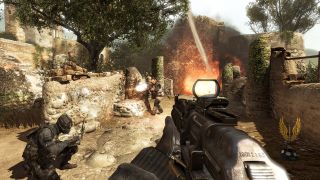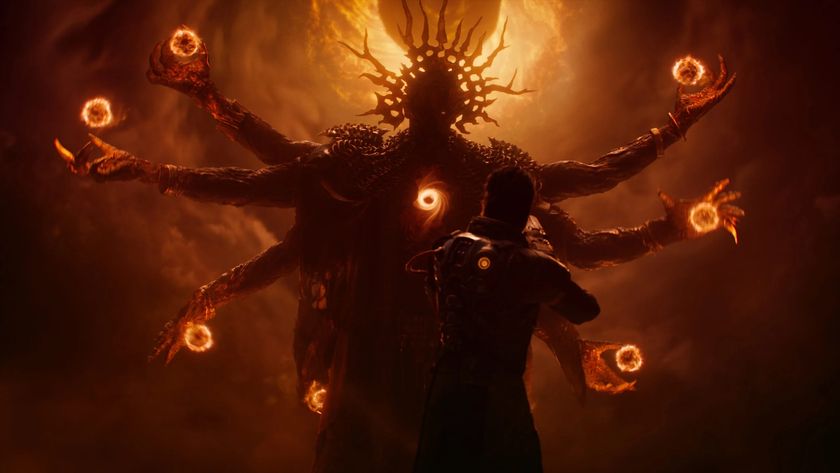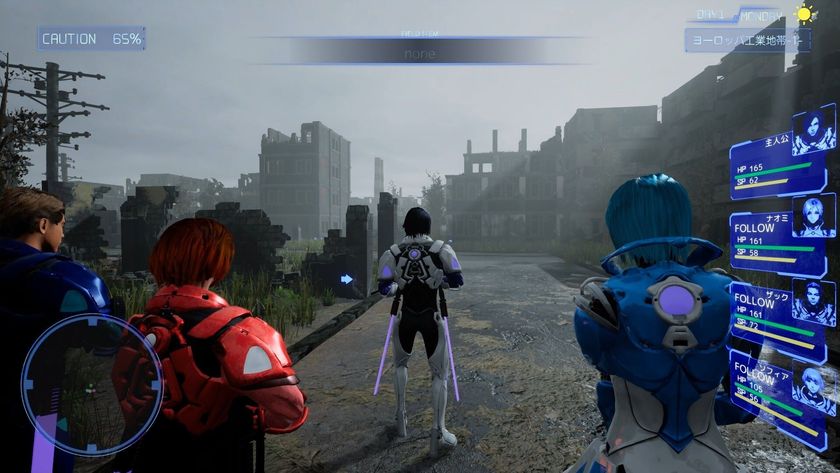Why has online gaming become so antisocial?
Remember the early days of online console multiplayer? When it was all brand new, and exciting, and felt a bit impossible, like our Xboxes were plugged into an extra-dimensional pool of pure magic at the wall, and communicating to each other via little psychic pixies who lived inside their cases? Remember how utterly goddamn thrilling that was, and how excited we were to clip on our mics, brave their aggressive plastic squeeze on our poor, bruised temples, and leap in for yet another night of fun, adventure, and chatting shit at each other, whoever and wheresoever we might be?
Yeah, we’ve kind of stopped doing that, haven’t we?

It’s been that way for a while, but I really noticed it when playing Grand Theft Auto Online the other night. Slowly, steadily, like the imperceptible but inexorable growth of a stalactite, or the progressive coating of a cave floor with bat shit, we’ve gradually turned away from that initial joy, allowing the fun of interacting with each other through games to become just another tertiary element to be ignored next to the game itself.
Why did I suddenly notice it the other night, after years of watching online socialising gradually erode around me? I think maybe because I was playing GTA, and having finished the campaign just before Christmas, after putting around 100 hours into the main story, the juxtaposition between the offline and online versions of Los Santos was stunning. And not in a good way. After more than four solid days-worth of play-time in Grand Theft Auto V’s living, reactive, dynamic city and countryside, the insertion of real, living people made it feel suddenly empty and sterile.
Okay, my initial hopes for the fun, anarchic, communal lunacy promised by the concept of a shared Los Santos were immediately deflated, when my first interaction with another player comprised being silently, anonymously stabbed while I browsed a shop. But things didn’t improve from that point on. I ran around. I drove around. I did stuff. I did missions. I did most of those missions alone or with people not on my server, after waiting 10 minutes for the lobby to populate. I sent mission invitations to everyone in my city, multiple times, and got no response.

I did get one guy to meet up for a quick arm-wrestle, but when I won, and he joined me in my car afterwards--myself foolishly thinking that this little bonding moment was to be the start of a grand, cross-city adventure--he promptly, silently and anonymously, shot me and stole my car before I could even apply foot to accelerator. Yes, I chased him down and ran him over upon respawn, but that’s not really the point.
The thing is, Rockstar seems to have designed GTA Online for precisely the opposite of this kind of unspeaking, slightly misanthropic, lone-wolf experience. There’s a shared San Andreas, with all the potential for ramped-up, amplified tomfoolery and creative, player-driven escapades that a 16-person server affords. There are player apartments. There are multiple hang-out spots. Player-created missions appearing in the game actively encourage experimental, communal play.
Sign up to the 12DOVE Newsletter
Weekly digests, tales from the communities you love, and more
And I know that GTA Online is capable of great things in that respect. I appeared on our sister-site CVG’s GTA V o’ Clock show a couple of weeks ago. We had a full server, a few semi-organised game modes, and a whole bnch of self-imposed stunts and challenges to complete or fail spectacularly. And you know what? It was by far the best time I’ve ever had with GTA Online. In real-world conditions though? Anonymous, lone killers all the way.

It’s not just GTA that has this problem. Every multiplayer game I’ve jumped into over the last year or so has been the same. Battlefield, that bastion of organised, co-operative, tactical combat? 90% of players are devoid of either mic or plan, running wildly around like disorganised mercs, hired for the same cause but working independently from each other. Even Batman: Arkham Origins, a multiplayer game which utterly demands tight co-operation, seems to be played the same way. In the couple of weeks I dabbled with it, I had precisely one good game, with a couple of chatty American guys who actually seemed to value the game’s most important mechanic. Communication.
We’re losing more than just efficient squad tactics as we become less talkative online. When I mentioned interacting through games at the start of this article, I wasn’t just talking about the mechanics of setting up a cross-fire. Games are a great medium for human interaction of any kind. In fact any kind of multiplayer game, video or not, exists pretty much for that purpose. I have a couple of friends who moved to the US a few years ago. We rapidly realised that we were crap at staying in touch via e-mail, so we all installed World of WarCraft and met up there once a week. It gave us a focal activity, which made sure that we met up regularly, but the game itself remained secondary to us simply hanging out. It was a chat-room with gameplay, basically.
On a slightly different note, back in the heyday of Call of Duty 4, boozy weekend lobbies were a regular fixture amongst the staff and readers of a site I worked prior to GamesRadar. Some players I knew in person, many I didn’t, and plenty I’d never met before. But we were always a tight unit by the end of the night. We’d fill up our lobby, then take our team touring the world, taking on the best and worst it had to offer in increasingly silly, increasingly raucous Domination matches. I added a fair few people to my friends list from the opposition along the way too. It was a hoot.

But those sort of shared experiences and game-driven meetings seem increasingly rare these days. When I fire up a game’s online mode, I never expect to see more than a couple of people with mics, and I’m rarely surprised. Maybe part of the problem comes from the fact that today's XP-heavy online games rarely ever offer group rewards. Think about the badges and trinkets you get thrown after a match. All skewed towards individual achievements, no? Even in team-based games, lone-wolf behaviour is almost exclusively rewarded. How about more squad rewards for co-operative actions more significant than accidental assists?
Maybe the problem is also that we became complacent about online multiplayer after the initial excitement wore off. And then perhaps we began to get cynical. Like any online interaction, gaming has its fair share of issues. And through repeated complaining and lampooning in editorial and on forums, those problems eventually became clichés. And the problem with something becoming a cliché or a stereotype is that that process then allows us to more easily discard it off-hand, wholesale, without considering the bigger, more nuanced picture.
We hear someone playing crap music over their mic, or aggressively ordering their team around, and we instantly think “Oh yeah, online multiplayer is crap, isn’t it? Headset off”. We get one bad apple and we write off the whole thing, because “that’s just what online multiplayer is like”. We constantly refer to ourselves as “the gaming community”, but in my experience over the last year or so, we’re cutting ourselves off from being that more and more. Someone being a dick in a lobby? Mute them. It’s that easy. But how about we deal with the undesirables on a case-by-case basis, rather than bulldozing a house because of the roach problem? Sometimes it is good to talk to strangers.
Most Popular







